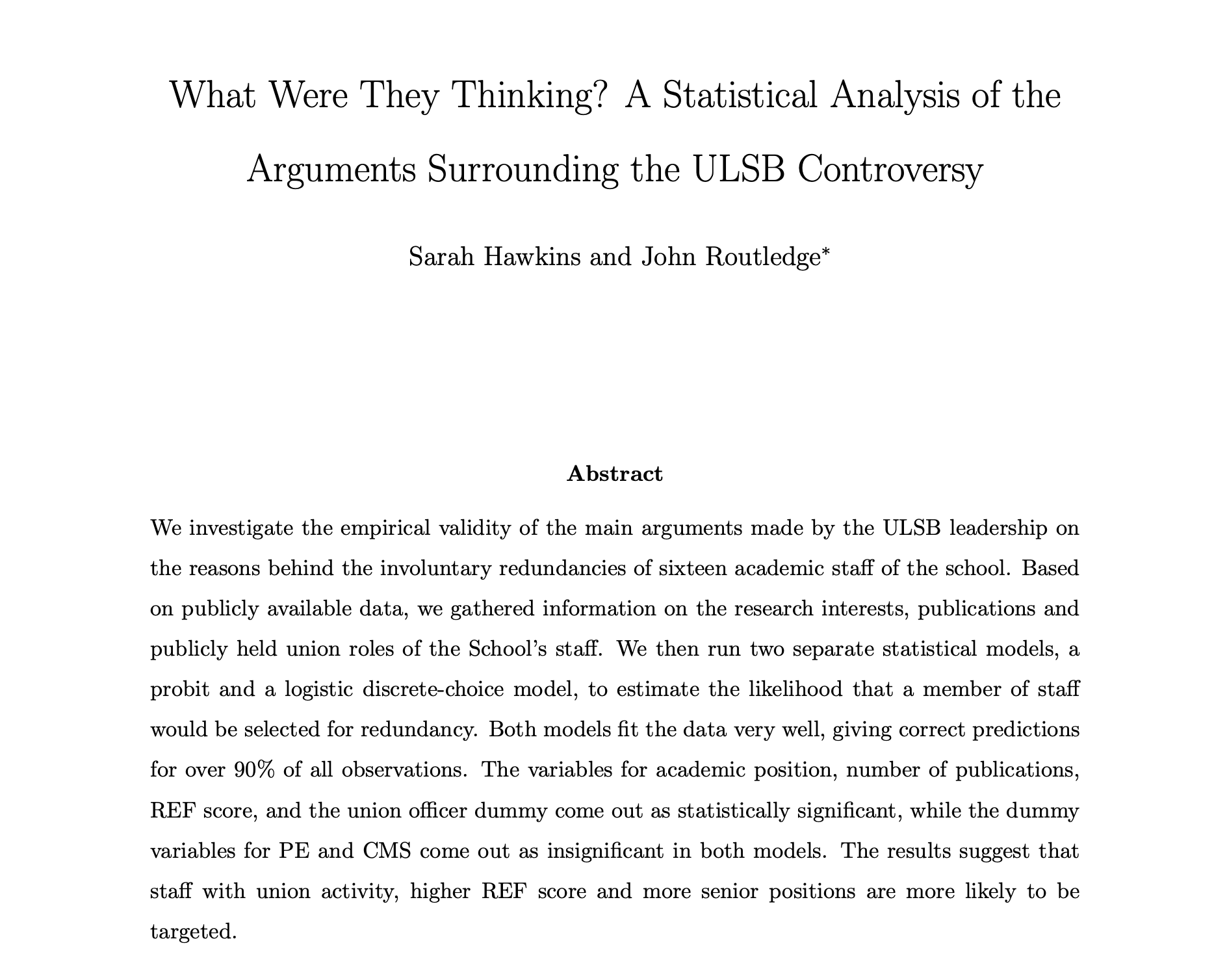Published: 23rd March, 2021

Statistical modelling shows no evidence to support the claim that redundancies in the School of Business are about disinvesting from political economy and Critical Management Studies. By far the most statistically significant factor is union activism. An underperforming Economics, Finance & Accounting professor who researches in political economy has a 5% chance of redundancy if they stay out of the union. However, if they decide to become a UCU officer, the chance of redundancy rises to over 80%.
Those implementing the redundancies of colleagues in the School of Business – the School’s dean James Devlin; his deputy Dan Ladley, head of the College of Social Sciences, Arts and Humanities, Henrietta O’Connor; former pro-VC Research Lisanne Gibson; and, of course, the Vice-Chancellor Nishan Canagarajah and his deputy Edmund Burke – claim they wish to ‘disinvest in scholarship and research in critical management studies [CMS] and political economy [PE]’. They further claim that there is no element of discrimination against active members of the University of Leicester branch of UCU.
In this report, ‘What were they thinking?’, two School of Business faculty comprehensively debunk both claims.
Below are some key extracts:
The main findings of our investigation are as follows. First, there is little statistical evidence to suggest that the selected members were being targeted on the basis of their research interests alone. This may at first seem a very striking result, because all of them are active in either the PE or the CMS area or in both. Moreover, ULSB’s leadership was very explicit in its communications that staff were selected for redundancy because they engaged in these research areas and they made the decision to strategically disinvest from the two areas. However, many other academics in the school have research interests in these areas. We present simple descriptive statistics that show that up to 50% of the staff can be classified as having publications in the past five years in at least one of the two targeted areas. Once this is taken into account, it is perhaps unsurprising that the statistical significance of the variables associated with research interests is rendered insignificant in our analysis.
Second, the single most significant predictor of the management’s selection criteria seems to be public involvement in trade union activities. As we elaborate in the next section, we proxy union activism by a dummy variable which indicates if a member of staff currently holds a publicly observable role within Leicester UCU. It turns out that nine of the sixteen targeted members do. This is an important finding, because it lets us view the controversy from an entirely different perspective.
Third, the results from research activity are mixed. While the variable for research quantity comes up negative and significant, the variable for REF score comes up positive and significant. This means that although the targeted individuals have (on average) less publications than the non-targeted ones, they have generated higher research quality. This result is perplexing, because it makes hard to decipher the management’s research strategy. It seems that they plan to disinvest from the research areas where the school has a comparative advantage, which is typically the opposite of what one would expect from a rational organisation. It also contradicts the statements made by the university’s leadership team that the university intends to increase its research focus around its strong areas.
And from the report’s conclusion:
We exploited a rather unusual event, the announcement of involuntary redundancies in the academic sector, and in ULSB in particular, in order to test several competing hypotheses of what might have been the underlying factors behind them. Our results are rather unsettling. Although the school’s leadership team claims that the criterion for the redundancies is based solely in the plans for disinvestement from the research areas of CMS and PE, we found little evidence in support of this claim. At the very least, if this plan is to be borne to fruition, several other waves of redundancies must follow.
However, the single best predictor of selection is union activism. A member of staff that has been actively involved in publicly visible UCU roles has a significantly higher chance of being targeted than otherwise. This is extremely troubling because it indicates that fundamental working rights are coming under attack and it probably violates, if not the letter, then the spirit of employment law. This hypothesis is further corroborated by the fact that the targeted members are on average more senior and with higher calibre of publications than the average school member. At face value, this seems to contradict the very core of the leadership’s arguments for investing in the school’s future and improving its research quality.